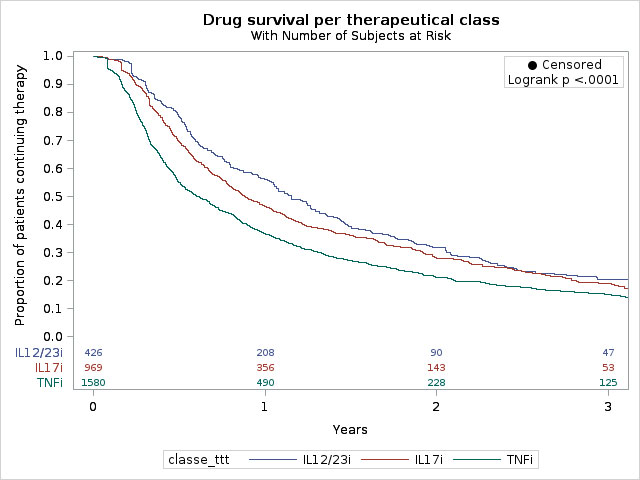Session Information
Session Type: Poster Session D
Session Time: 1:00PM-3:00PM
Background/Purpose: Tumor necrosis factor inhibitors (TNFi) are most often the first choice biologic treatment for patients with psoriatic arthritis (PsA). When their discontinuation is needed, a switch to another TNFi or to another therapeutic class may be considered. However, data supporting one approach over the other are lacking. Our objective was to assess the long-term persistence of second-line biologics in PsA patients with prior TNFi exposure.
Methods: This nationwide cohort study involved the administrative healthcare database of the French health insurance scheme linked to the hospital discharge database (SNDS). We included all adults with PsA starting a second line of biologic, after discontinuing a TNFi, during 2015-2020. Persistence was defined as the time from biologic initiation to discontinuation and was estimated by the Kaplan-Meier method. Comparison of persistence by biologic class involved using Poisson regression models with time divided into 6-month intervals.
Results: We included 2,975 patients: 1,580 (53%) initiating a second TNFi, 426 (14%) an interleukin (IL) 12/23i, and 969 (33%) an IL17i. Overall 1- and 3-year persistence rates were 42% and 17%, respectively (Figure 1). After adjustment, IL17i (RRa 0.79, 95%CI 0.71-0.87) and IL12/23i (RRa 0.69, 95%CI 0.61-0.79) were associated with higher persistence than TNFi. We found no difference between IL12/23i and IL17i (RRa 0.88, 95%CI 0.76-1.02).
Conclusion: Overall, this real-life study shows low persistence rates for all biologic at 3 years in second-line PsA patients previously exposed to TNFi. However, those persistence rates were higher with IL17i or IL12/23i than with TNFi.
To cite this abstract in AMA style:
Pina Vegas L, sbidian E, Claudepierre P. Long-term Persistence of Second-line Biologics in Psoriatic Arthritis Patients with Prior TNF Inhibitor Exposure: A Nationwide Cohort Study from the French Health Insurance Database [abstract]. Arthritis Rheumatol. 2022; 74 (suppl 9). https://acrabstracts.org/abstract/long-term-persistence-of-second-line-biologics-in-psoriatic-arthritis-patients-with-prior-tnf-inhibitor-exposure-a-nationwide-cohort-study-from-the-french-health-insurance-database/. Accessed .« Back to ACR Convergence 2022
ACR Meeting Abstracts - https://acrabstracts.org/abstract/long-term-persistence-of-second-line-biologics-in-psoriatic-arthritis-patients-with-prior-tnf-inhibitor-exposure-a-nationwide-cohort-study-from-the-french-health-insurance-database/

